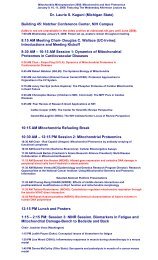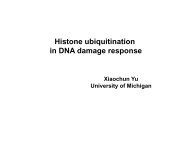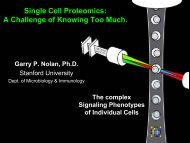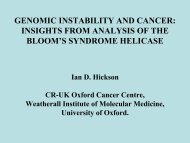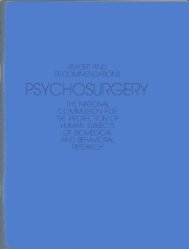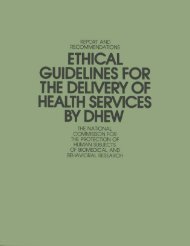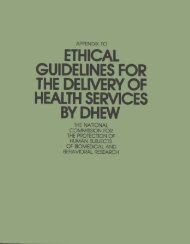RESEARCH ON THE FETUS - National Institutes of Health
RESEARCH ON THE FETUS - National Institutes of Health
RESEARCH ON THE FETUS - National Institutes of Health
Create successful ePaper yourself
Turn your PDF publications into a flip-book with our unique Google optimized e-Paper software.
so for the third. The confusion is understandable, rooted as it is in the<br />
Court's invocation <strong>of</strong> the specially constructed legal fiction <strong>of</strong> "potential"<br />
human life, its acceptance <strong>of</strong> the notion that human life must be "meaningful" in<br />
order to be deserving <strong>of</strong> legal protection, and its resuscitation <strong>of</strong> the concept<br />
<strong>of</strong> partial human personhood, which had been thought dead in American society<br />
since the demise <strong>of</strong> the Dredd Scott decision. Little wonder that intelligent<br />
people are asking: how can one who has no right to life itself have the lesser<br />
right <strong>of</strong> precluding experimentation on his or her person?<br />
It seems to me that there are at least two compelling answers to the<br />
notion that Roe and Doe have placed fetal experimentation, and experimentation<br />
on nonviable infants, altogether outside the established protections for human<br />
experimentation. First, while we must abide the Court's mandate in a particular<br />
case on the issues actually decided even though the decision is wrong and in fact<br />
only an exercise <strong>of</strong> "raw judicial power" (White, J., dissenting in Roe and Doe ),<br />
this does not mean we should extend an erroneous rationale to other situations.<br />
To the contrary, while seeking to have the wrong corrected by the Court itself,<br />
or by the public, the citizen should resist its extension to other contexts.<br />
As Abraham Lincoln, discussing the Dredd Scott decision, put it:<br />
"(T)he candid citizen must confess that if the policy <strong>of</strong><br />
the government upon vital questions affecting the whole<br />
people, is to be irrevocably fixed by decisions <strong>of</strong> the<br />
Supreme Court, the instant that they are made, in ordinary<br />
litigation between parties in personal actions, the people<br />
will have ceased to be their own rulers, having, to that<br />
extent, practically resigned their government, into the<br />
hands <strong>of</strong> that eminent tribunal." (4 Basler, The Collected<br />
Works <strong>of</strong> Abraham Lincoln 262, 268 (1963).)<br />
Thus even if the Court had intended by its Roe and Doe rationale to exclude the<br />
unborn, and newly born nonviable infants, from all legal protection including<br />
that against harmful experimentation, I can see no legal principle which would<br />
justify, let alone require, passive submission to such a breach <strong>of</strong> our moral<br />
tradition and commitment.<br />
Secondly, the Court in Roe and Doe did not have before it, and presumably<br />
did not intend to pass upon and did not in fact pass upon, the question <strong>of</strong><br />
experimentation on the fetus or born infant. Certainly that question was not<br />
78



